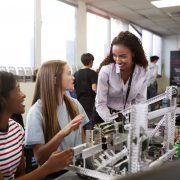What Are the Most Important STEM Skills to Teach Students before College?
What STEM skills should be part of a curriculum for K-12 students?
Many educators think first of courses that teach specific skills like chemistry, math, and physics. Those teachers are right – specific, teachable subjects like those prepare students for college STEM studies and careers.
But what about softer skills and attitudes, which can be defined as abilities that equip students to absorb and apply technical concepts?
In “The 7 Most Important STEM Skills We Should Be Teaching our Kids,” an article that Caralee Adams wrote for weareteachers.com, Ms. Adams asked seven STEM educators to name one important skill that STEM-oriented students should learn in school.
Here are the softer STEM skills that the educators recommended:
Statistics – “A deep understanding of statistics means understanding probability and error rates, concepts that cut across almost any kind of problem you want to solve in STEM,” according to Gregg Fleisher, president of the National Math and Science Initiative.
Problem-solving – “A practicing engineer will tell you, `I didn’t use the calculus I learned to solve problems on paper, but the way it taught me to solve problems . . . was really important,’” wrote James Brown, executive director of the Stem Education Coalition.
Creativity – “You’ve got to look at a problem from a different perspective sometimes,” according to Jenny Nash, education specialist with LEGO Education.
Argumentation – “In the STEM fields, this means using analytical and critical-thinking skill . . . and then using data to support a claim,” wrote Eric Brunsell, director of the teacher education program at the University of Wisconsin, Oshkosh.
Intellectual Curiosity – “You need to be able to cut across disciplines and be able to ask the questions that help build connections,” wrote Ted Wells, chief strategy officer at STEMConnector.
Data-Driven Decision-Making – “Students need to be able to make a decision not just based on what they think or feel, but on scientific data,” according to Stacy Klein-Gardiner, director the Center for STEM Education for Girls at Harpeth Hall Schools in Nashville.
Flexibility – “People are now required to adapt quickly to new demands and new situations,” wrote Claus von Sastrow, COO and director of research at Change the Equation.
Related Posts about STEM
Reading List for Parents of STEM Students
Strategies for Early STEM Learning
Who Is Preparing for STEM Careers? Our Research Finds Surprising Gaps
Do STEM Studies Prepare Students to Excel in the Humanities?
We Invite You to Explore All Your Career and College Options. . .
Participate in the National Career & College Pathway Study to gain new insights about making educational decisions that align with your interests, passions, and aptitudes.










Trackbacks & Pingbacks
[…] Image Source: https://www.studentresearchfoundation.org/blog/stem-skills-to-teach-students/ […]
Leave a Reply
Want to join the discussion?Feel free to contribute!